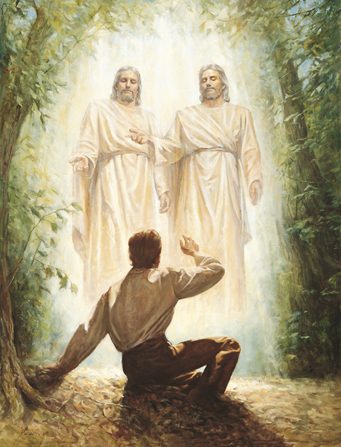
(LDS. org)
It was the palpable genuineness of Joseph Smith’s accounts of his experiences that brought the British literary critic and educator Arthur Henry King into the Church of Jesus Christ of Latter-day Saints in 1966. “When I was first brought to read Joseph Smith’s story,” he wrote,
I was deeply impressed. I wasn’t inclined to be impressed. As a stylistician, I have spent my life being disinclined to be impressed. So when I read his story, I thought to myself, this is an extraordinary thing. This is an astonishingly matter-of-fact and cool account. This man is not trying to persuade me of anything. He doesn’t feel the need to. He is stating what happened to him, and he is stating it, not enthusiastically, but in quite a matter-of-fact way. He is not trying to make me cry or feel ecstatic. That struck me, and that began to build my testimony, for I could see that this man was telling the truth.[1]
King cites the passage from Joseph Smith where the Prophet describes his encounter with James 1:5:
Never did any passage of scripture come with more power to the heart of man than this did at this time to mine. It seemed to enter with great force into every feeling of my heart. I reflected on it again and again, knowing that if any person needed wisdom from God, I did; for how to act I did not know, and unless I could get more wisdom than I then had, I would never know; for the teachers of religion of the different sects understood the same passages of scripture so differently as to destroy all confidence in settling the question by an appeal to the Bible.[2]
“He doesn’t try to express his feelings,” remarks Professor King.
He gives a description of his feelings instead, which is a very different thing. . . . I am not good enough to write a passage as good as that. That is beautiful, well-balanced prose. And it isn’t the prose of someone who is trying to work it out and make it nice. It is the prose of someone who is trying to tell it like it is, who is bending all his faculties to expressing the truth and not thinking about anything else—and above all, though writing about Joseph Smith, not thinking about Joseph Smith, not thinking about the effect he is going to have on others, not posturing and not posing, but just being himself.[3]
Jill Mulvay Derr and Karen Lynn Davidson have commented similarly upon the “simplicity and understatement” of the Joseph Smith’s 1838 autobiographical narrative of the First Vision and the circumstances leading up to it:
Joseph Smith proposes simply to “present the various events . . . in truth and righteousness” [verse 2]. He begins his account not with a thundering prophetic declamation, but with simple truths, a list of easily verifiable facts—his birth, the names of his family members—and goes on to describe the religious confusion surrounding him and his family. Although he becomes slightly more descriptive as he continues with the account of the vision itself, with words like “astonishing” [verse 15] and “despair” [verse 16] to characterize the events and his reactions, even the First Vision itself calls forth a spare, almost minimal retelling. The language is measured and dispassionate, non-defensive, the voice of a mature adult reflecting eighteen years later upon a vision he received as a boy. Joseph Smith knows exactly what he saw and heard that day, and he is willing to let the events carry their own impact, without a great deal of comment or emotional language. Above all, he does not cast himself in a heroic role. He was an ordinary boy who offered a simple prayer, with no real notion of what was to follow.[4]
[1] Arthur Henry King, “Joseph Smith as a Writer,” in Arthur Henry King, Arm the Children: Faith’s Response to a Violent World, edited by Daryl Hague (Provo: BYU Studies, 1998), 285-293. The quoted passage is from page 288. Compare his comment at Arthur Henry King, “An Account of My Conversion,” on page 43 of the same book.
[2] Joseph Smith—History 1:12.
[3] King, “Joseph Smith as a Writer,” 289.
[4] Jill Mulvay Derr and Karen Lynn Davidson, “The First Vision in Eliza R. Snow’s Unfinished Epic on the Life of Joseph Smith,” 7 (unpublished paper in the possession of the author, discussed in Richard L. Bushman’s Joseph Smith Seminar at Brigham Young University, on 18 July 2002).
Posted from Nauvoo, Illinois











